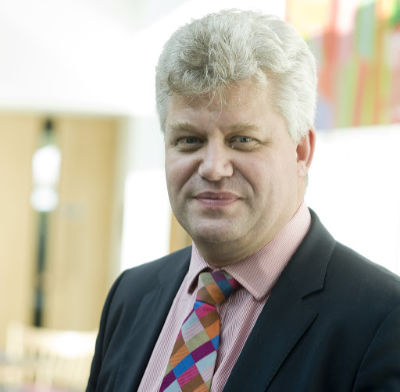02
Foreword
Andy Neely

Professor Andy Neely, Pro-Vice-Chancellor for Enterprise and Business Relations at the University of Cambridge
Cambridge has a deep and rich history of discovery and collaboration. Currently, the Cambridge cluster is home to a vibrant life science community, including a number of world-leading science and technology companies, over 630 life science companies and £18bn total turnover from knowledge intensive firms.
The University of Cambridge plays a significant role in the cluster by providing academically rigorous ideas, innovation, talent and skills. We also provide a supportive and dynamic ecosystem which enables natural collaboration between strong academic research and the key translational capabilities that are largely found in industry. Our success in the life and physical sciences relies on a combination of factors and careful nurturing of the right conditions to stimulate curiosity, conversation and collaboration that lead to the lightbulb moments which change the world.
Historically, Cambridge has demonstrated its ability to embrace change and adapt accordingly, seeing obstacles as opportunities. Our question is how can we learn from our Cambridge phenomenon roots and continue to maintain our position as a global leader in health tech into the next generation with the new challenges we currently face?
By developing Connect: Health Tech, a Cambridge University Enterprise Zone (UEZ), we have taken the time to analyse, reflect and capitalise on our current ecosystem to provide a realistic but ambitious roadmap for the University to support the future growth of the cluster.
Many of the challenges identified during this analysis are cultural, demonstrating the importance of creating the right environment for ideas, start-ups, innovation and co-creation to thrive. The analysis also reinforces how investment in sustaining the culture of an ecosystem is equally important as investment in buildings, physical space, transport and infrastructure. With the right stakeholders sharing their knowledge, ideas and expertise, the willingness to invest (time and money) and the common altruistic goal of creating wealth for the region through collaboration and partnerships, we will continue to evolve and innovate. This will enable us to accelerate the design, development and testing of the diagnostics, devices and therapies of the future. The benefits of this are wide-ranging, from building capabilities and skills to providing scalable solutions for digital collaboration, and will support the growth of health tech in the cluster. This report sets out the ambitious steps needed to build strong foundations for the next 20 years.
